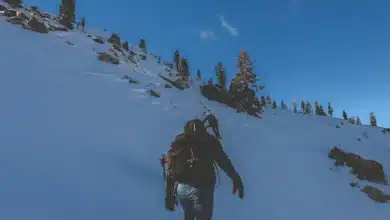Do You Need to Worry About Bears in Winter?
When you’re in bear country in the summer, there are common bear safety rules to follow – carry bear spray, store food in bear canisters, and know how to handle bear encounters. But should you worry about bears in winter? Do bears attack more during winter? After hours of research, I found some things that may just surprise you.
Are bears active in winter? Depending on the time of year, type of bear, and location, bears may be active during winter. In some locations, bears are active year-round, while bears in other locations are not.
Do Bears Really Hibernate or Not?
When I first began my search on bear hibernation, I was under the impression that bears hibernate. After reading articles on the topic, I learned that bears aren’t your typical hibernators.
Instead, bears, go into a winter state of torpor, which is a more active form of hibernation, but not true hibernation. Bears don’t drop their body temperature as low as other mammals that do hibernate, which often causes confusion about what “hibernation” really means.
The more I dug into the scientific literature, I learned that bears are now classified as hibernations, often being called “super hibernators”. What we’ve been learning about bears has changed the way biologists define hibernation.
New knowledge of hibernation processes has led biologists to redefine mammalian hibernation simply as specialized, seasonal reduction of metabolism in response to the concurrent pressures of food unavailability and low environmental temperatures.
Bear Center Conducts Hibernation Study by Lynn Rogers
For example, smaller animals have to wake up every few days and raise their body temperature to urinate and defecate, while bears do not. Bears can sleep for months without eating, drinking, urinating, or defecating. They basically recycle their waste. It’s really amazing.
However, not all bears hibernate, and some hibernate for different lengths of time.
How Long Do Bears Hibernate For?
We are still learning a lot about bears and are still learning more. There have been studies done on various bears and how long they hibernate in different locations.
Check out the chart below to see how long bears hibernate in different states (source).
| Bear Location | Dormancy Time |
| Southern Alaska | 7 months |
| Montana | 6.5 months |
| Washington | 4 months |
| Arizona | 4 to 5 months |
| North Carolina | 3.5 months |
You may also like How to Prevent and Treat Frostbite When Hiking
In general, the further south, the less time bears spend hibernating. There are sometimes other factors that come into play and there are exceptions.
Black bear hibernation behavior becomes much more complex in southern regions. Factors like weather, food availability, vegetation could come into play, but we don’t know for sure.
The relative roles that food availability, weather, physical condition, functional adaptation to local climate, and evolved physiology play in this behavior remain a matter of speculation.
DAVID M. GRABER, National Park Service
But in some regions, bears can be active during winter. In Arizona, for example, it’s been reported that bears are sometimes active in warm days. In Southern California and Virginia, bears have been known to be active all winter (source).
During the spring, bears in North America typically wake from hibernation near the beginning of April and as early as mid-march. But in lower climates or unusually warm winters, bears can wake up as soon as January or February.
Do Bears Attack in Winter?
If bears are active, it’s possible they may attack in winter, though bear attacks are rare and bear attacks in winter are even rarer.
Bear attacks are actually a lot less of a worry compared to other outdoor risks and their danger is probably exaggerated, by a lot.
While it may be argued that human beings have an innate fear of bears, much of our reaction is based on myth, ignorance, exaggeration, and sensationalism.
Timothy Floyd, MD, FACS – Bear-inflicted human injury and fatality
During winter, there are a lot more dangers to worry about than bears. By the numbers, about 10 bear injuries happen per year, with 1 death, but it’s still a good idea to stay alert.
And just because a bear is denning for the winter, doesn’t mean they aren’t aware of their surroundings. Skiers, snowboarders, and hikers could unknowingly pass by a bear den and alert a bear, causing it to awaken to defend itself.
Bears usually den in rock cavities, brush piles, and hollow trees, making them harder to notice.
Bears encountered suddenly are the primary reason for attacks. Studies done from bear attacks in Yellowstone National Park found that 99% of injuries from bears resulted in sudden encounters.
And it’s not just hikers who need to be alert. Snowboarders and skiers who are in the mountains around March and April can come across bears as they begin to emerge from their winter sleep.
You may also like Ways to Carry Cellphone When Hiking
Why Bear Attacks Happen
The likelihood of a bear attacking really depends on the situation, the type of bear, and the sex.
In most instances, black bears will run away when encountered.
A bear’s reaction to a sudden encounter with human beings depends on the bear’s species and sex. Black bears of both sexes, including females with cubs, generally run away from humans as soon as the latter are detected.
Timothy Floyd, MD, FACS – Bear-inflicted human injury and fatality
But when it comes to a brown bear with cubs, mothers will aggressively attack intruders. Studies show 70-80% of all brown bear encounters occur with females with cubs (source).
If we look into the data further, we’ll see that there are more black bear attacks than brown bears, even though brown bears are the most aggressive. This is because there are more black bears than brown bears.
The two most common reasons why bears attack is due to sudden encounters and provocation.
Sudden encounters happen when bears don’t realize your presence until you are close by. This happens more often with backcountry hikers. A good rule of thumb is to stay on established roads and trails.
As far as provocation, this can happen innocently enough. There have been unfortunate events where photographers have been killed by bears hanging around too close. It’s advised that hikers stay at least a quarter mile away from bears.
Bear Safety Tips
If you’re camping or hiking in the winter, it’s still a good idea to practice good bear safety. There’s a lot of other animals to look out for besides bears, such as raccoons, coyotes, and small rodents.
Here are some general tips for bear safety in winter:
- Carry bear spray (like this brand), not just for bears, but other animals too. Keep in mind, spray range is reduced in cold weather.
- Use a bear canister in areas with bear activity.
- Bear bag or lock up your food. Bear bagging is the practice of hanging your food from a tree.
- In Alaska, foghorns seem to have eliminated bear encounters.
- Bear bells may work, though there are conflicting opinions about their effectiveness and dangers.
- Watch the ground and trees for bear activity, such as tracks and fresh scat.
- Keep campsites clean and food stored in airtight storage containers outside of tents
- Travel in groups. Bear attacks are drastically reduced when hiking in numbers.
The best tip for dealing with bears is to call and check with the local agencies and ask. Speaking with experienced staff will inform you of bear activity in the area and other dangers to look out for.
You may also like One Trekking Pole or Two, Which Is Better?
Do You Need Bear Spray in Winter?
Sometimes that hikers often wonder is if they need to carry bear spray in winter and if it will actually work in the cold.
If you’re hiking in the backcountry, it might not be a bad idea to carry bear spray in the winter. There are many other animals like cougars and elk who can attack humans. One very popular brand is SABRE. Check out SABRE Bear Spray on Amazon.
Bear spray will work in the cold. Bear spray does not freeze, but it’s effectiveness (spray range) will be reduced, particularly around freezing temperatures. In cold weather, it’s best to carry your bear spray close to your body inside winter to help keep it warm.
One cool tip we read for travelers who can’t carry bear spray on planes is to call up the local hotels and outdoor stores and ask if you can purchase left behind bear spray for cheap. Often times, visitors know they can’t fly with bear spray so they leave them behind.



